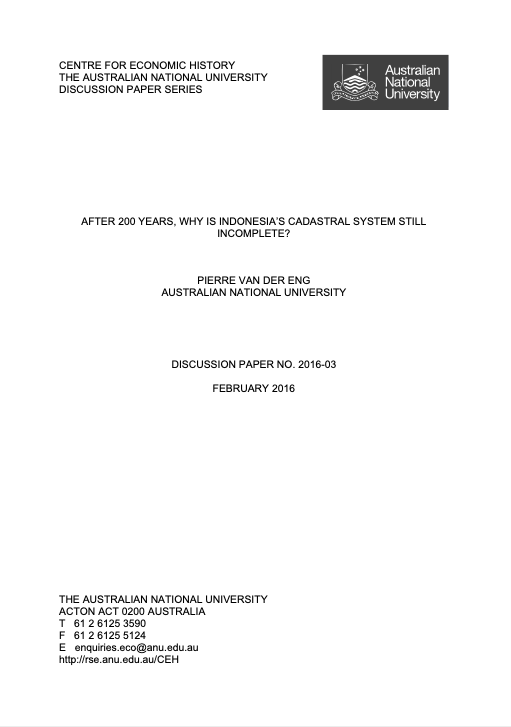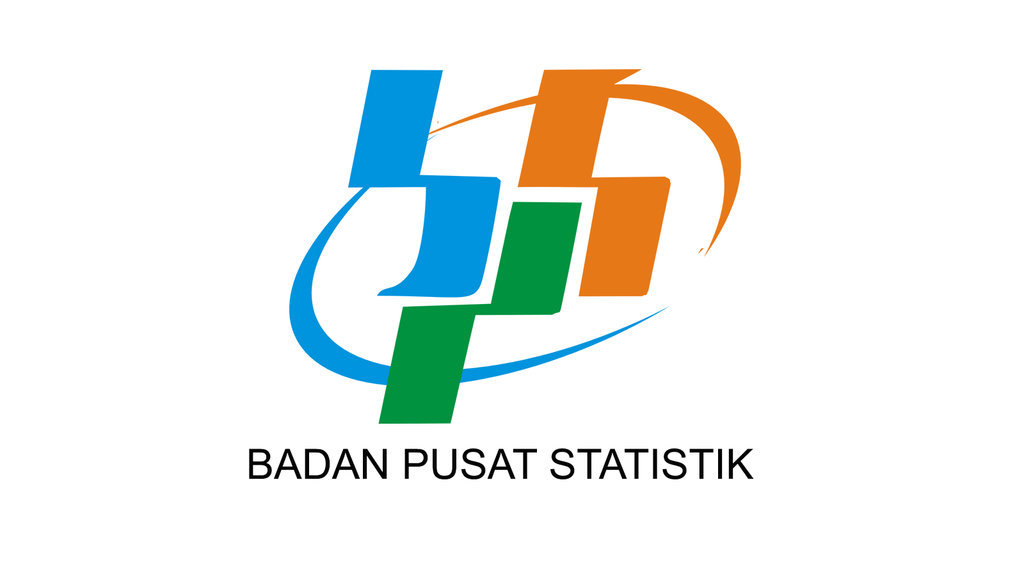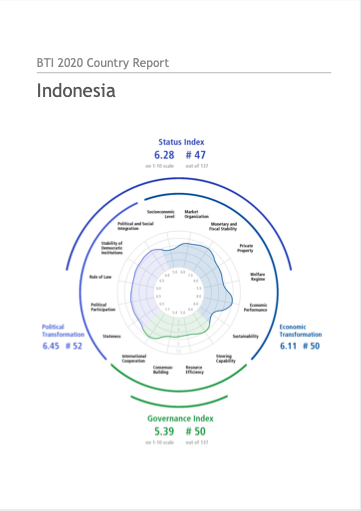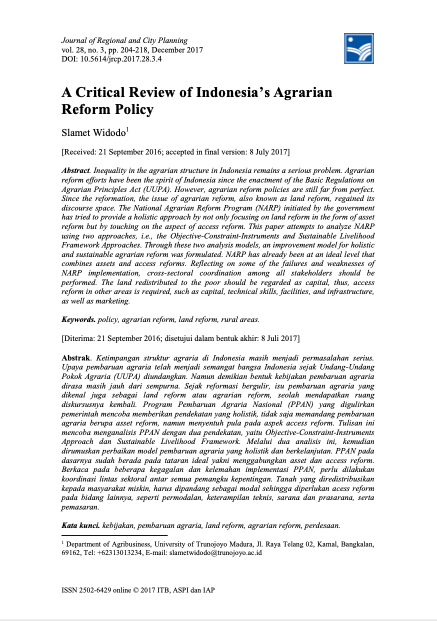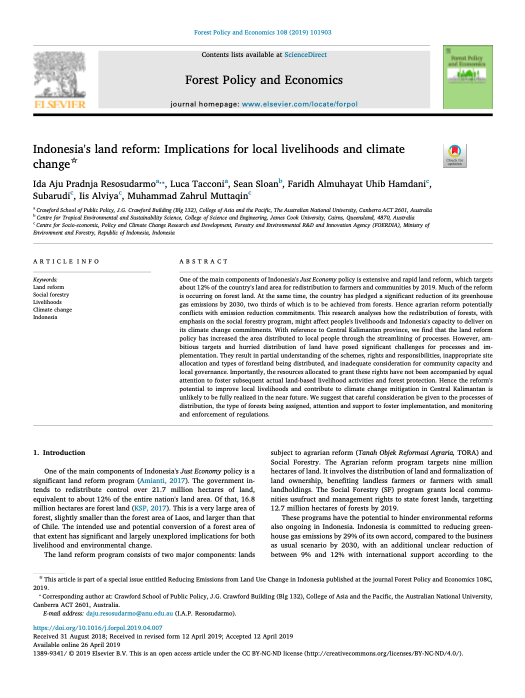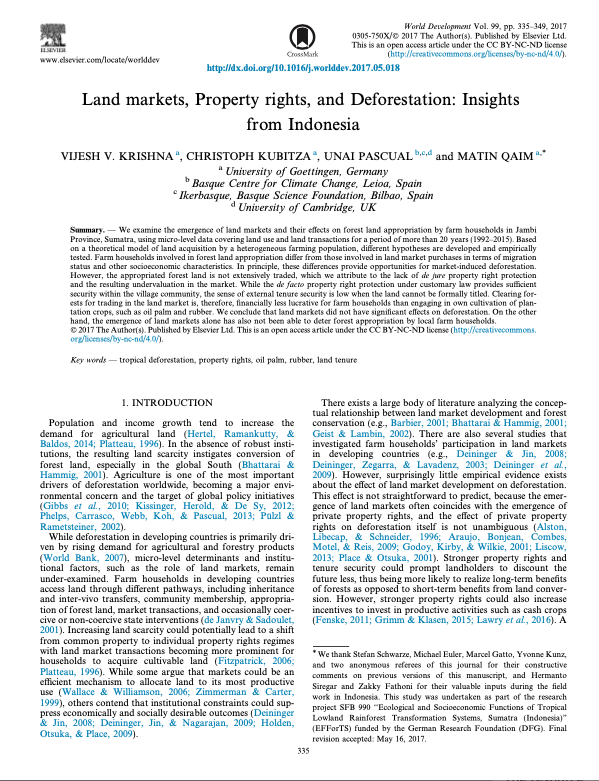
Topics and Regions
Daniel Hayward (UK) worked around Europe for 15 years as a dancer, choreographer and dance writer. Following retraining in sustainable development, he now works as an international development researcher, focused on land relations, agricultural value chains, gender, and migration. As well as working for Land Portal, Daniel is the project coordinator of the Mekong Land Research Forum at Chiang Mai University, and consultant for a variety of local and international NGOs and research institutes.
Details
Location
Contributions
Displaying 801 - 810 of 835After 200 Years, Why is Indonesia's Cadastral System Still Incomplete?
This paper discusses Indonesia’s experience with establishing a uniform cadastral system in rural areas since the idea was first mooted in the early 19th century. Until 1961, a formal cadastre that identified, measured, registered and certified land titles existed only in urban areas. A cadastre for rural land did not start until after the 1960 Agrarian Law. Until then, the village-based land tax registers acted as a substitute cadastral register in areas subject to land tax.
CRITICAL NATURE: Are China’s dams on the Mekong causing downstream drought? The importance of scientific debate
This article was originally published through CSDS (Center for Social Development Studies) at Chulalongkorn University, Thailand. It can be found at: https://www.csds-chula.org/publications/2020/4/28/critical-nature-are-chinas-dams-on-the-mekong-causing-downstream-drought-the-importance-of-scientific-debate
In Tanintharyi, an indigenous alternative to Big Conservation
Communities in biodiverse Tanintharyi Region are spurning big, top-down projects and seeking recognition for their own approach to conservation.
From its forested borderlands in the east, to vast mangrove forests and hundreds of island ecosystems in the Andaman Sea to the west, Tanintharyi Region is a bastion of nature and biodiversity. The region is home to one of the largest remaining expanses of intact low-elevation evergreen forest in Southeast Asia, a stronghold for endangered and endemic species including tigers, tapirs and pangolins.
STATISTIK INDONESIA 2019 - Statistical Yearbook of Indonesia 2019
Statistical Yearbook of Indonesia 2019 is an annual publication presenting various data from BPS-Statistics Indonesia and other agencies. The publication provides general pictures of geographic and climate conditions, government, as well as key socio-demographic and economic characteristics of Indonesia. The data in some particular tables are presented at provincial and international level to compare socio-economic condition inter-regions and inter-countries.
Badan Pusat Statistik (BPS - Statistics Indonesia)
Badan Pusat Statistik (BPS-Statistics Indonesia) is a Non-Ministry Government Agency directly responsible to the President.
BTI 2020 Country Report Indonesia
Between 2017 and 2019, the quality of democracy in Indonesia continued to slowly but noticeably decline. While President Jokowi was able to de-escalate the conflict between the government and Islamist groups to some extent, he only managed to do so by integrating some Islamist themes and actors into the government structure. This, in turn, moved Indonesia ideologically and politically to the (religious) right. Religious, social and political minorities were the biggest losers of this shift.
A Critical Review of Indonesia’s Agrarian Reform Policy
Inequality in the agrarian structure in Indonesia remains a serious problem. Agrarian reform efforts have been the spirit of Indonesia since the enactment of the Basic Regulations on Agrarian Principles Act (UUPA). However, agrarian reform policies are still far from perfect. Since the reformation, the issue of agrarian reform, also known as land reform, regained its discourse space.
Journal of Regional and City Planning
Journal of Regional and City Planning or JRCP is a tri-annual open access journal mainly focusing on urban and regional studies and planning in transitional, developing and emerging economies. JRCP covers topics related to the sciences, analytics, development, intervention, and design of communities, cities, and regions including their physical, spatial, technological, economic, social and political environments.
Indonesia's land reform: Implications for local livelihoods and climate change
One of the main components of Indonesia's Just Economy policy is extensive and rapid land reform, which targets about 12% of the country's land area for redistribution to farmers and communities by 2019. Much of the reform is occurring on forest land. At the same time, the country has pledged a significant reduction of its greenhouse gas emissions by 2030, two thirds of which is to be achieved from forests. Hence agrarian reform potentially conflicts with emission reduction commitments.
Land markets, Property rights, and Deforestation: Insights from Indonesia
We examine the emergence of land markets and their effects on forest land appropriation by farm households in Jambi Province, Sumatra, using micro-level data covering land use and land transactions for a period of more than 20 years (1992–2015). Based on a theoretical model of land acquisition by a heterogeneous farming population, different hypotheses are developed and empirically tested. Farm households involved in forest land appropriation differ from those involved in land market purchases in terms of migration status and other socioeconomic characteristics.

